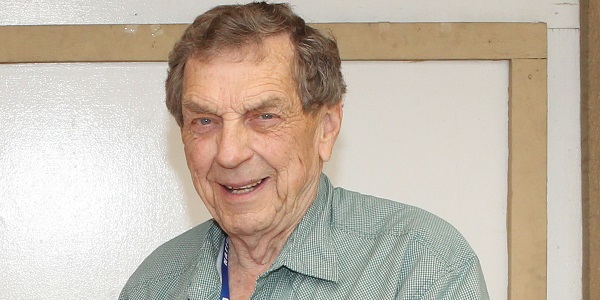His hip was broken in a fall earlier in the day, so he was unable to attend an induction ceremony that night he never expected to be part of and wondered why he was.
Perhaps because selflessness was so ingrained in him it seemed part of his DNA.
“You girls should really go to the Hall of Fame,” he told his four daughters from his hospital bed that day. “I think it is going to be a nice party.”
Jack Walsh genuinely thought of others first, in ways small and large.
“He would always cut off the best part of a steak he was eating and give it to us,” said his daughter Kathy. “The best part of the t-bone was for us.”
He gave freely and easily, of his time, his work, his hobbies, himself…to the countless individuals he defended as a public attorney working out of Stillwater, to the many horseman and stable help he represented on the backside at Canterbury Park, frequently if not almost always without charge.
“He represented more than 100 horsemen before the (Minnesota Racing) commission,” said long-time friend and horse breeder Jeff Hilger. “He was a very humble man, the most honest one I’ve known.”
That was Walsh’s reputation, not only in his profession but throughout the horse racing scene in Minnesota and beyond. He was tireless in his advocacy of the down and the out, the individual without the background or finances to defend himself.
“That was his whole life, as a public defender, as a dad, as a neighbor,” Kathy said. “He was so many things__ lawyer, farmer, horseman, father, grandfather.
Walsh’s daughters _ Laura, Julie, Jackie and Kathy _ stood in for their father during his induction into the Canterbury Park Hall of Fame the night of September 1. He did not make it that night or thereafter to Canterbury Park, a place he was part of, originally as a horse owner, since it opened as Canterbury Downs in 1985. He died on September 27 at age 86.
Walsh’s selection to the Canterbury Park Hall of Fame puzzled him. He did not understand why he would be chosen to join so many others he thought “truly deserving” of induction.
“He was so surprised and honored,” Kathy said. “He couldn’t believe it, that ‘these people chose me.’ ”
His family and friends knew better, including the people who came to count him as a friend after he offered them support in any of various matters that came before the racing commission or in a court of law.
Walsh had just finished his term as president of the Horsemen’s Benevolent and Protective Assn., a role he stepped into in August of 2016 upon the death of Tom Metzen, a man he counted as a friend.
“Jack was very professional,” said trainer Bernell Rhone, a member of the HBPA board. “He was always willing to help the underdog. He was not looking for publicity or high profile clients. He did things to help people out. He donated a lot of his time, and he didn’t charge for it.”
Walsh announced that he would not seek re-election to the position after battling a number of health issues in the previous year and was replaced as president this autumn by horse owner/breeder Scott Rake.
Yet he will be missed in many other ways. “He would fight for the guy without much money. He wasn’t after the big money cases like a lot of lawyers,” Rhone added.
Walsh stayed involved from the start, in numerous ways. He served on the board of the Minnesota Thoroughbred Association for several years and the local chapter of the HBPA.
Randy Sampson, the CEO of Canterbury, dealt with Walsh on numerous occasions, in meetings regarding contracts, purses or other horsemen’s issues and was frequently on the other side of a subject.
“I never heard one person say a bad word about Jack,” Sampson said. “Even on the opposite side of an issue. He had a very diplomatic way of handling things. Even if he disagreed with you, he said it in a way that was respectful and usually with a twinkle in his eye.”
Walsh was always on top of issues and understood them fully before he spoke. “He was very smart,” Sampson added, “and knew what was going on. He could get right to the heart of an issue. He was a gentleman in such a way that is a lost art today. He was fun to be around.”
His friends appreciated his marvelous sense of humor. He loved telling the latest joke to them and any acquaintances who happened to step into his inner circle, particularly at the table he occupied on the first level whenever he was at Canterbury.
The horsemen with whom he connected appreciated his sincere interest in their welfare. He dealt with them openly, without the slightest suggestion of an ulterior motive.
“He got kind of thrown into a hot spot when we lost Tom,” said HBPA board member and trainer Tony Rengstorf. “But he took over and did an awesome job. He had a heart of gold and was such an amazing ambassador for racing.”
The backside understood that. “Absolutely,” Rengstorf added. “He cared about the people, the children.”
At one time Walsh had as many as twenty quarter horse broodmares on his property outside Somerset, Wisconsin. He sold off some sixty head of quarter horses when Canterbury Downs opened in 1985 and turned to thoroughbreds. Those he bred himself usually carried “Somerset” as part of their names, so it was easy to identify one of his runners in a lineup.
Father Paul Malone paid tribute to Walsh’s long affiliation with horses during his funeral services with the following story:
“What is the difference between praying in church and praying at the racetrack? ” he asked the congregation. “When you pray at the racetrack,”
Malone said, “you mean it.”
Jack Walsh would have loved it.
JIM WELLS
